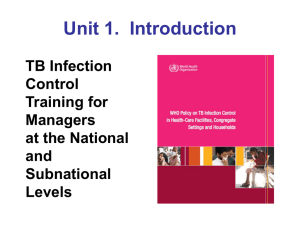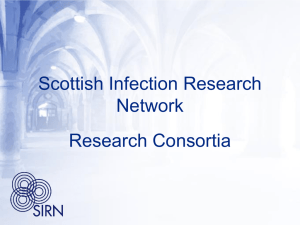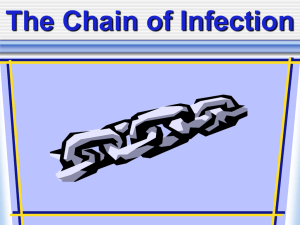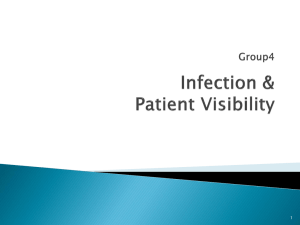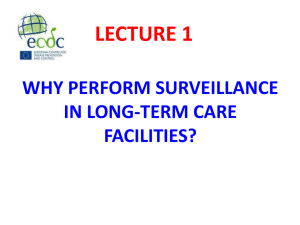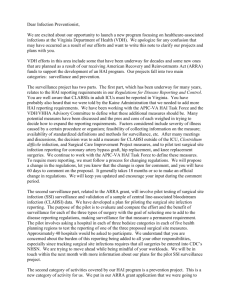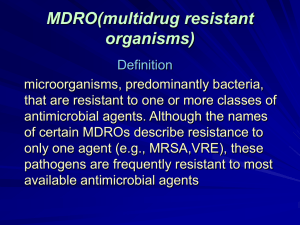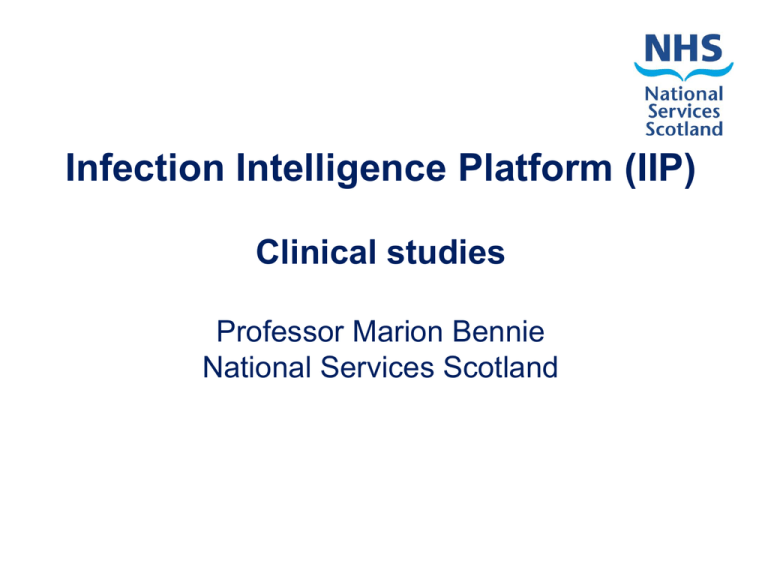
Infection Intelligence Platform (IIP)
Clinical studies
Professor Marion Bennie
National Services Scotland
Vision
• A comprehensive, dynamic and
responsive resource capability for
Scotland that will harness existing health
data to support clinicians in improving
patient outcomes and reduce harm from
community and healthcare acquired
infection.
Vision
Intrinsic (patient)
•Age / gender
•Colonised
•Morbidity
PATIENT
(Community and
Healthcare acquired
Infection )
•Drug history
•Vaccine history
Infection Management
Antibiotic policy
Infection control
(TBP - Transmission based precautions)
Patient outcome
Monitoring / Surveillance
Intended consequences
Unintended consequences
Extrinsic (environment)
- Medicines (prior use)
- Lines/Catheters
- Hand Hygiene
- Surgery
-Length of stay
Prevention Intervention
SIPS- Standard infection
control precautions
Antimicrobial stewardship
NHS BOARD SOURCES
NSS SYSTEMS (HAI & AM)
HPS
SOURCES
ISD SOURCES
Staphaureus
Bacteraemia
Data(SAB)
1. REFERENCE
LABORATORIES
[CHI]
1. ECOSS
DATABASE
(INTERNAL)
(EXTERNAL)
Clostridium
difficile
infection
Data (CDI)
COMMUNITY
HEALTH
INDEX
REGISTRY
SCOTTISH
MORBIDITY
RECORD
DATABASE
(SMR)
Hospital
Medicine
Utilisation
Database
(HMUD)
Prescription
Information
Scotland (PIS)
DATA
RESPOSITORY
- Clinical Quality
Indicators
-Scottish Patient
Safety Programme
NATIONAL
AUDITS
Antimicrobial
Resistance
Data (AMR)
HAI
HEALTH PROTECTION
SYSTEMS
NHS
LABORATORIES
SCI
STORE
INFECTION
PREVENTION &
CONTROL
SYSTEMS
(IPC)
PATIENT
ADMINISTRATION
SYSTEMS
2. Surgical Site
Infection (SSI)
3. Catheter
Associated Urinary
Tract Infection
(CAUTI)
4. Prevalence
Survey
(PPS)
5. HELICS
WIN (ICU/ECDC)
CAREHOME
AGE
SEX
Antibiotics
(SSI)
Prescription
Information
System for
Scotland
(PRISMS)
INFECTION
ANTIBIOTICS
ICU Ward
Watcher
HOSPITAL
INFECTION
TX
Scottish Audit of
Surgical
Mortality (SASM)
CAREHOME
Antimicrobial
Management
Integrated
Database for
Scotland
(AMIDS)
HEALTH
PROTECTION
SYSTEMS
SMR DATA
JOINT & OTHER
INFECTIONS
Arthroplasty
14. TRAVEL
(TRACKER)
LINES
INFECTION
MORTAILITY
Renal Registry
6. MRSA
SCREENING
13. Gastrointestinal
& Zoonotic System
(GIZ)
PATIENT SAFETY
SYSTEMS
7.NOROVIRUS
WARD
CLOSURES
OTHER LOCAL
SYSTEMS
PRESCRIBING
DATA SYSTEM
8. HAND
HYGINE AUDITS
9. Surveillance of
Healthcare
Outbreak System
(SHORS)
INFECTION – NO HAI
IV ANTIBIOTICS
date/time
Scottish Trauma
Audit Group
(STAG)
12. Blood Borne
Virus (BBV)
Musculoskeletal
Access Audit
(MSk)
No
The Scottish
Stroke Care
Audit (SSCA)
No
11. RESPIRATORY
10. VACCINE
UPTAKE
LEGEND
Data
Data store
Database
Output
NHS Scotland Infection
Intelligence Platform Road Map
Future Position
Enhanced connectivity and linkage
of existing national and local
information to improve prevention
and management of infection,
reduce harm and minimise waste
Further enhancement of connectivity to include
current and future local databases
Full Capability
Capability building
Incremental planned studies focussing on key infection
related clinical goals.
Infrastructure to routinely connect current relevant national databases
with infection information.
Current Position
No strategic approach:
Uncoordinated integration of
databases through small
pockets of resources from
national and local
programmes on an hoc basis
Setup
Generic capability to support patient care, enable measurement of
intended and unintended consequences of interventions.
Benefits (Improve care - reduce
harm - reduce variation)
• Patients
– Support individual prevention/treatment plans
• NHS Boards
– Drive quality improvement in local service
delivery model (intended/ unintended
consequences)
• National Surveillance
– Identify emergence of antimicrobial resistance
• Research
– Support evidence based clinical practice
Deliverables (2013-2016)
• To gain the necessary information governance
approvals
• To build the required IM&T Infrastructure to
support the IIP by technically linking six sources
initially
• To complete a series of exemplar clinical studies
to test the IIP capability and effectiveness
Key Datasets
• ECOSS Electronic Communication of Surveillance in Scotland
(antimicrobial resistance data)
• HMUD Hospital Medicines Utilisation Database
• PIS Prescribing Information System (primary care prescribing)
• SCI Store Clinical Information (e.g. Lab results, Radiology reports)
Repository
• SMR Scottish Morbidity Record (SMR)SMR01
– Inpatients, Day Cases, Discharge & Diagnosis
– SMR02 – Maternity Inpatients, Day Cases, Discharge &
Diagnosis
– SMR99 – Mortality
• SSIRS Surgical Site Infection Reporting System
Study Themes
Themes
Study Number
1. Identification of Risk Factors for selected Common
Bacteraemias
Study 1 & 2
2. Validation of IIP for Surgical Site Infection (SSI)
surveillance
Study 3
3. Impact of Primary Care antimicrobial prescribing on
antimicrobial resistance patterns and HAI
Studies 4-7
4. Mortality associated with HAI
Studies 8 & 9
5. Sepsis Diagnosis, management and outcome
Studies 10-13
6. Intended and Unintended consequences of antimicrobial
prescribing change in surgery
Studies 14-16
Theme 1 - Risk Factor Analysis
in bacteraemias
(ECOSS / SMR – studies 1&2)
• To describe the demographics and co-morbidities
of patients with common bacteraemias and CDI
– SAB and E.Coli (test -SIRN funded)
– Extend to include MRSA,MSSA, CDI
– Establish routine linkage for ongoing
surveillance as risks of infection changeover
time
Theme 4 - Mortality Associated
with HAI
(ECOSS / SMR/SSIRS – studies 8&9)
• To determine the case fatality (30 and 90 days)
associated with common HAI
– SSI, SAB, CDI (test )
• To identify variation in case fatality associated
with risk factors
• To produce standard reporting mechanisms for
MRSA and CDI death from 2015 (current system
to stop in 2014)
Theme 2 - Surgical Site Infection
(SSI) surveillance
(ECOSS / SMR/SSIRS – study 3)
• Current manual collection of data locally to input
into national datamart
• Mandatory minimum of 2 operation categories
(caesarian and hip arthroplasty mandatory, where
practised)
• To test capability of IIP to reproduce data (SSIRS)
through routine record linkage (ECOSS and SMR )
to replace the need for manual data collection
within the Health Boards.
Theme 3 - Primary care
antimicrobial prescribing - impact
on resistance patterns and HAI
(ECOSS / SMR//PIS – studies 4-7)
• To develop generic surveillance system to estimate
associations
– Antimicrobial exposure and risk of CDI
(test – SIRN funded ) then extend to other HAI
– Examination of 4 antimicrobials in UTIs and impact
on resistance and clinical outcome (test – SIRN
funded ) then extend to other infections
Theme 5 - Sepsis: diagnosis,
management and outcome
(SMR/SCI Store – studies 10-11)
• Use of blood culture as a proxy marker for sepsis
• To quantify changes in 30 day mortality (from date
of blood culture) following adoption of restricted
antibiotic policy (test – Tayside and Lanarkshire )
then extend to all NHS Boards
• Establish robust sepsis outcome measure to
monitor progress to national target
Theme 5 - Sepsis : diagnosis,
management and outcome
(SMR/SCI Store/HMUD/HEPMA – studies 12-13)
• Monitoring impact of key high risk antibiotics in
hospitals e.g. carbapenameses on emergent
bacteremias
– Policy change intervention
– Individual patient level outcome
Theme 6 - Surgery –
consequences of changing
antimicrobial prescribing policies
(SMR/SCI Store/HMUD – studies 14-16)
• To examine renal toxicity (acute kidney injury)
following introduction of restricted antibiotic policies
– Test in NHS Lanarkshire
– Extend to all NHS Boards and for other identified
laboratory measures
• To evaluate reduction in 4C use and impact on CDI
and mortality



